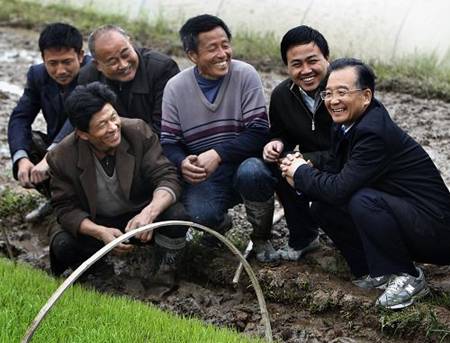Protect farmers or face future frustrations
- By Zhang Yunxing
 0 Comment(s)
0 Comment(s) Print
Print E-mail
China.org.cn, January 16, 2012
E-mail
China.org.cn, January 16, 2012
 |
|
Chinese Premier Wen Jiabao talks with farmers in a village in east China's Anhui Province. [File photo] |
In an article published Jan. 16 in the journal Qiushi, Chinese Premier Wen Jiabao urged against replicating city-style communities in the countryside which would force farmers to live in high-rise buildings.
In the article, Wen argued that the countryside's unique environment and ecology should be preserved, and that the decision to move to the city or remain in the countryside should be left to the farmers themselves. Wen also called on construction departments to improve village planning and help farmers build better houses.
On farmers' rights, Wen wrote: "Rights to the contracted management of land, use of house sites and the sharing of collective gains are protected by law; no one is entitled to deprive farmers of these rights."
Protecting farmers' land rights
A series of interviews with more than 7,000 migrant workers in 20 cities by the State Council Development Research Center found that the majority were unwilling to exchange their contracted land and house sites for residency in cities. The interviews also revealed that more than 80 percent (83.6%) wished to keep their land, and Two-thirds (66.7%) wanted to keep their countryside house sites and properties.
In recent years, China has seen an increasing number of countryside protests triggered by land disputes. These protests are an indication that farmers' land rights are poorly protected.
At the Central Rural Work Conference held on Dec. 28, 2011, delegates pushed for increased protection of farmers' land rights. They also called for farmers to receive additional revenue when their farms' land value appreciates, a measure which Premier Wen has already described as being central to the reform of the land acquisition system.
The land sales revenue picture tells a story of rising returns and insufficient investment. Government revenue from land sales has increase from 51.4 billion yuan in 1999 to 2.9 trillion yuan in 2010. The proportion of land sales in government fiscal revenue rose from 9.2 percent in 1999 to 35.4 percent in 2010. Revenue from land sales during the first 10 months of 2011 reached 2.59 trillion yuan. However, only 12.74 million yuan, or 4.9 percent, was subsequently invested in agriculture-related projects.
Urbanization dilemma
According to a Social Blue Book released by the Chinese Academy of Social Sciences in December 19, 2011, the urban population accounts for more than 50 percent of China's total population, and China's urbanization level is in excess of 50 percent.
According to Han Jun, deputy director of the State Council Development Research Center, finding jobs for these farmers-turned-urban residents and helping them adapt to urban life will pose a major problem for China in the future.
The changing supply and demand of labor has meant that the interests and demands of farmers-turned-workers have also changed. Their new demands include jobs and increased salaries, and equality in relation to issues such as housing, social security, working conditions and their children's education. Han noted that even minor issues related to these areas could spark major conflicts and even trigger mass protests.






Go to Forum >>0 Comment(s)